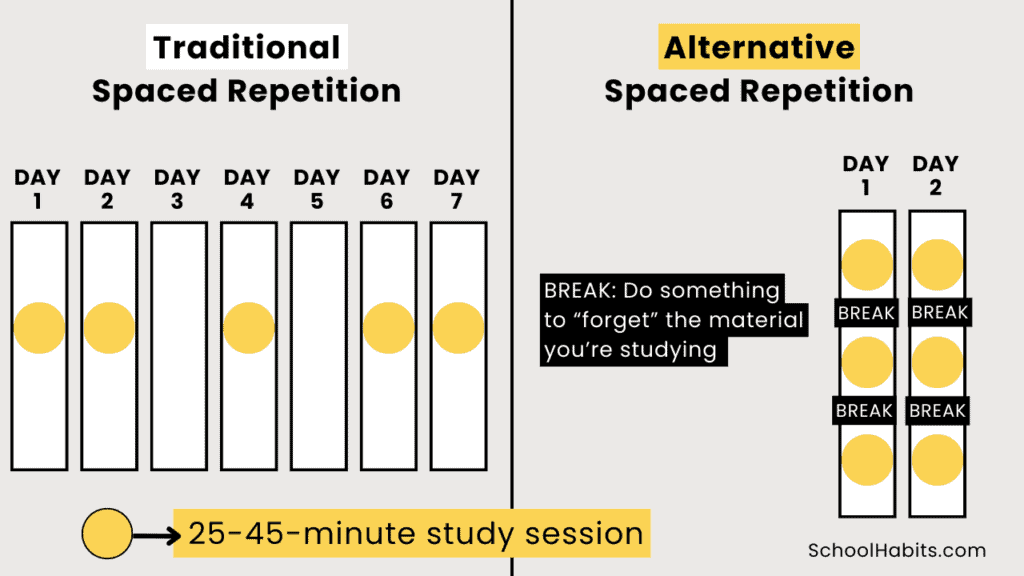Katie Azevedo, M.Ed.
In a perfect world, you’d have at least two weeks’ notice before every high school or college exam. You’d have plenty of time to study without pressure, and you’d feel calm and prepared on test day.
But, for some silly reason, we don’t live in a perfect world. (I know – how unfair.) In our very real world, your teachers or professors may only give you a few days’ notice before tests – sometimes even just one day – and that’s when you need to switch up your study methods.
In this blog post, you will learn how to study for a test you just found out about. I teach you two strategies to use when you’re in a situation beyond your control and you don’t have much time to study. The strategies are best used together. (Combine them.)
How to Study For a Test You Just Found Out About: 2 Last-Minute Study Methods
The strategies below should only be used when you have no other option. Do not rely on these strategies as a way to shorten your study time for tests that you actually have more time to study for. Promise me this!
1. Study Only What You Don’t Know
If you only have a few days to prepare, you want to study only what you don’t know. Sometimes we study what we already know because it feels good and makes us feel confident. But you don’t have time for that.
How to figure out what you don’t know:
- Run through your topics (use your study guide if you’re given one) and do your best to separate what you know from what you don’t know.
- To help separate what you know from what you don’t know, you could:
- Use the blurting method: Write down everything you know about a topic – when you can’t write anymore, assess how much you were able to write for each topic. What was missing? What areas were you unable to write about?
- Explain the material to someone else: If you can’t explain a topic clearly, you don’t understand it well enough (yet)
- Finalize your list of topics you don’t know. You will need it for the next study step.
Another strategy for figuring out what you don’t know so you can focus your study efforts is to use the Feynman Technique.
2. Use Alternative Spaced Repetition
Spaced repetition is one of the best frameworks for scheduling study sessions. You need to understand traditional spaced repetition before you can understand the strategy that I’m teaching you here, which I call alternative spaced repetition.
Traditional spaced repetition involves planning multiple study sessions, spaced out over the course of a few weeks. This is what I want you to use when you have one to two weeks to prepare for an exam.
But you’re here because you want to learn how to ace a test you just found out about, and this means you won’t have one to two weeks to study. In other words, you can’t use traditional spaced repetition because you don’t have time.
Over the years, I have figured out that using a different kind of spaced repetition can work – to a degree – when you don’t have much time to study. Is it perfect? Absolutely not. But it’s better than nothing. Here’s how it works.
Instead of having short study sessions every day or every few days (traditional spaced repetition), plan multiple short study sessions in the same day (alternative spaced repetition).
In the image below, you can see an example of traditional spaced repetition vs alternative spaced repetition.

How to Study for a Test Using Alternative Spaced Repetition
- Try to plan three 25-45-minute study sessions in one day. If you have two days to study, plan three 25-45-minute study sessions for both days – which equals six total study sessions.
- Aim to have as much time as possible between each study session. The obvious schedule is to study in the morning, afternoon and night (see image).
- In between your study sessions, do something different that will encourage your brain to “forget” what you’re studying.
With traditional spaced repetition, enough time passes overnight so that you “semi-forget” what you’re studying… which means when you study again the next day, you reinforce those concepts by bringing the information back into your short-term memory. This is actually how learning works.
If you’re using alternative spaced repetition, you don’t have the luxury of time to help you forget the material. This means you have to hack it by doing something else that’s cognitively demanding in between your study sessions.
For example, let’s say you have a physics test tomorrow. You’ve planned three 45-minute study sessions for one day: morning, afternoon and night. The goal is to try to force the material out of your working memory before the next study session. One way to do this is to do your English or philosophy reading in between the sessions, as reading is challenging and different enough that your brain will have no choice but to release some of the physics material you were studying.
This is a good thing! Every time you return to material that you “almost forgot” (using active recall), you strengthen your understanding of it.
Final Notes About How to Study for a Test You Just Found out About
The best way to study for a test you just found out about is to learn the material along the way. When you learn the material gradually, as it’s being taught to you, you reduce the amount you need to study. Here is my tutorial where I teach you how to study less – read it when you’re done with this post.
One more note: The night before your exam, do these 8 things.


